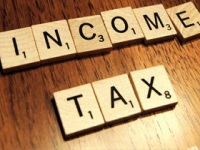The proposed new tax regime appeared to be more than fine, until the fine print came out.
The ‘new and simplified’ personal income tax regime, which is optional, offers lower rates to taxpayers. Here is how they compare.
|
Taxable Income Slab (`) |
Existing Tax Rates |
New Tax Rates |
|
0-2.5 Lakh |
Exempt |
Exempt |
|
2.5-5 Lakh |
5% |
5% |
|
5-7.5 Lakh |
20% |
10% |
|
7.5-10 Lakh |
20% |
15% |
|
10-12.5 Lakh |
30% |
20% |
|
12.5-15 Lakh |
30% |
25% |
|
Above 15 Lakh |
30% |
30% |
However, the catch is - the lower tax rate is only applicable to individual taxpayers who forego ‘certain’ deductions and exemptions.
“The individual tax payers opting for the new tax structure cannot avail any deduction under chapter VIA (like section 80C, 80CCC, 80CCD, 80D, 80DD, 80DDB, 80E, 80EE, 80EEA, 80EEB, 80G, 80GG, 80GGA, 80GGC, 80IA, 80-IAB, 80-IAC, 80-IB, 80-IBA),” says the budget memorandum.
Simply put, such taxpayers cannot avail deductions and exemptions under insurance schemes, investing in ELSS, LTA (Leave Travel Allowance), HRA (House Rent Allowance), interest on housing loan on self-occupied property, standard deduction among others.
Is it worth opting for?
Experts feel individuals may end up paying more tax by opting for this new tax regime.
The finance minister said a person earning Rs 15 lakh per annum and not availing any deductions pays Rs 2.73 lakh in the prevailing tax regime. If the person opts for the new tax regime, he will pay Rs 1.95 lakh, a savings of Rs 78,000.
Tax experts say that Rs 78,000 is the maximum savings for an individual shifting to the new regime. This does not necessarily make it the better option as the exemptions under the prevailing tax regime helps investors in the long term.
Consider the example of an individual earning Rs 15 lakh per annum. He has to pay income tax of Rs.1.95 lakh under the new tax regime. However, if he opts for the existing tax regime and avails exemption under section 80C, 80D, 80 CCD and standard deduction, his effective income tax liability would come down to Rs.1.81 lakh, which is Rs.14,000 lesser than the new regime. If this investor gets HRA, LTA and other exemption and deductions, his tax outgo can be reduced further.
Navneet Munot, ED & CIO, SBI MF said, “The personal tax reductions was well intentioned but the flip side is that removal of exemptions could have negative implications for savings.”
Jimmy Patel, MD & CEO, Quantum MF says that a quick back-of-the-envelope calculation shows that the old IT tax rates with all the deductions helps save more. He adds that individual salary taxpayers would be the worst hit as more complexities have been introduced in the form of alternate income tax slabs with the removal of exemptions and deductions.
“Normally such deductions particularly u/s 80C of IT Act acted as a booster for family savings and growth of the associated financial services sector. The removal will have a dampening effect on such savings and sector growth. It would also have an impact on the proposed IPO of LIC,” Patel said.
However, the new tax regime allows deduction on account of employer's contribution to NPS
Sandeep Shrikhande, CEO, Kotak Mahindra Pension Fund says, “Fortunately for NPS subscribers, they can continue to avail deduction under Section 80CCD(2) on account of employer's contribution to NPS. This deduction is not amongst those to be excluded to avail new tax slabs.








